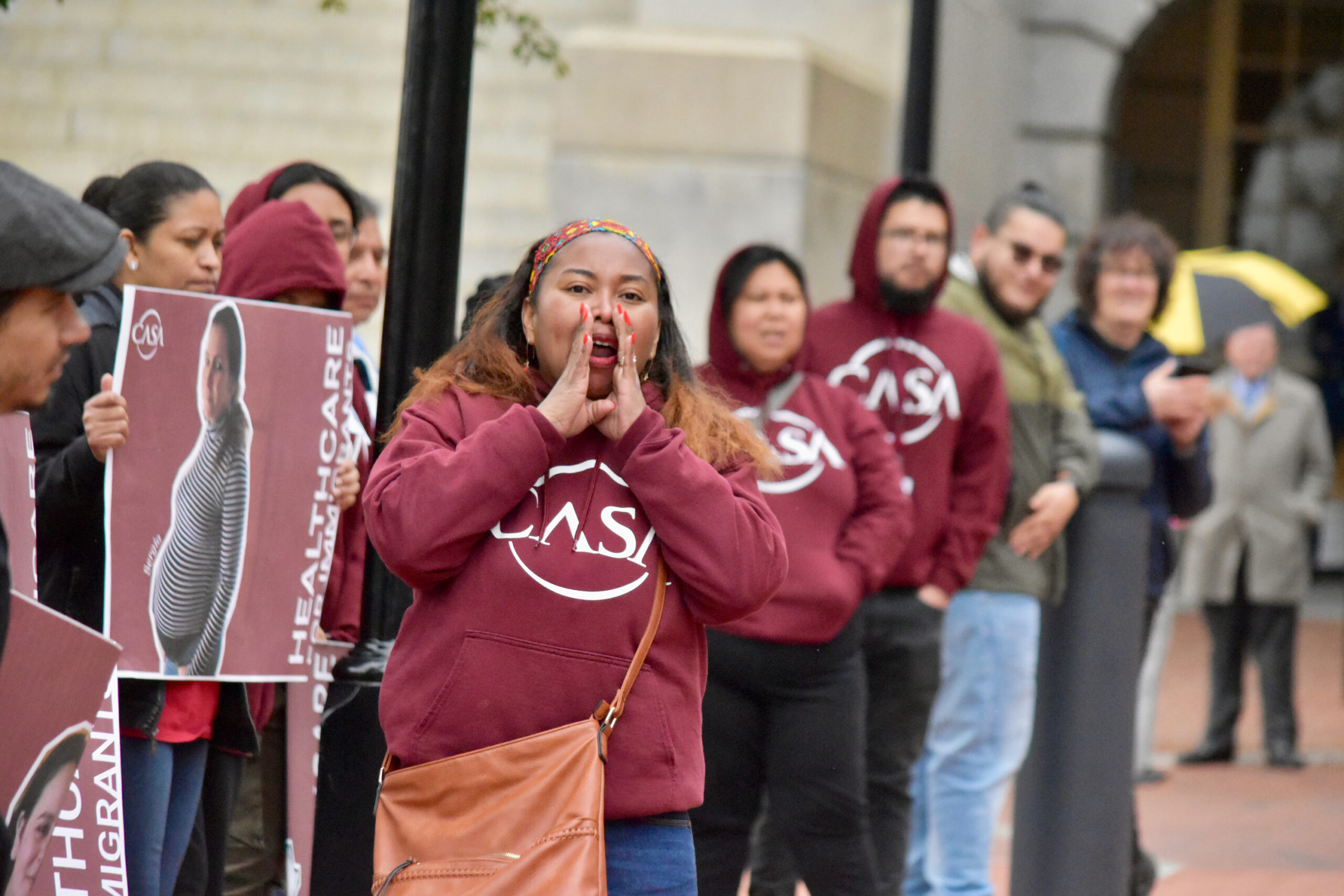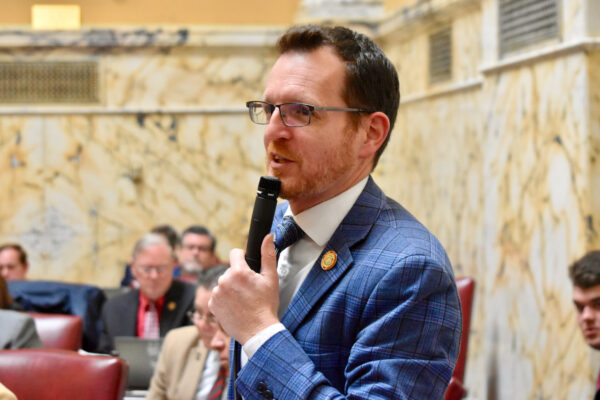Bill allowing undocumented residents to more easily buy health care finally clears Senate hurdle – Maryland Matters
Bill allowing undocumented residents to more easily buy health care finally clears Senate hurdle Maryland Matters


Access to Care Act Approved by Maryland Senate

Introduction
Members of Maryland’s immigrant population and their advocates are celebrating the Senate approval of legislation that would allow undocumented residents to more easily purchase private health care coverage off of the state’s insurance marketplace.
On Friday, the Maryland Senate approved the “Access to Care Act” on a party line vote of 34-13. With the House version of the bill already approved, the legislation is in good position to make its way to the governor’s desk.
Sustainable Development Goals (SDGs)
- Goal 3: Good Health and Well-being
- Goal 10: Reduced Inequalities
- Goal 16: Peace, Justice, and Strong Institutions
Background
The legislation is similar to a bill from the 2023 session that passed in the House of Delegates but stalled in the Senate.
SB 705, sponsored by Sen. Antonio Hayes (D-Baltimore City) and Sen. Clarence K. Lam (D-Howard and Anne Arundel), will prompt the Maryland Health Benefit Exchange to seek a waiver from the federal government in order to allow Maryland residents to purchase an individual private health care plan, regardless of immigration status.
Benefits and Challenges
The Access to Care Act does not provide subsidized or free health care options for undocumented immigrants, usually an economically disadvantaged group. It’s not clear how many undocumented residents will actually be able to afford the health care options that would be open to them on the Maryland Health Benefit Exchange.
“I have been trying to get that answer all throughout session…unfortunately, I haven’t been able to find a specific data point to say ‘X’ number of individuals will be able to buy it,” Amador-Hernandez said.
But she believes that the bill will help some members of CASA and other undocumented migrants as they shop for health care plans.
“Private plans and trying to compare and shop for those plans is very confusing, very complicated,” Amador-Hernandez said.
“When we think about the community that CASA serves, primarily immigrant, Black and brown, Latino immigrants, their access level is less than the broader community. Their ability to navigate government services may not be as well equipped as other individuals. Having access to the state marketplace is a big, real game-changer for them,” she said.
Opposition and Support

Sen. Justin Ready (R-Carroll and Frederick). Photo by Bryan P. Sears.
Opposition for the legislation came from Republican senators, who asserted that the bill incentivizes undocumented immigrants to come to Maryland and not worry about trying to become legal citizens.
“What we are seeing in our country today is a surge of illegal immigration,” Minority Whip Justin Ready (R-Carroll and Frederick) said on the Senate floor.
“We’ve done everything imaginable to have a flashing green neon sign that says, ‘Hey, come here. Come here’…Maryland is moving forward with policies that make our state much more attractive for people to come here who should not be in the country. They’re here illegally,” he said.
Sen. Johnny Mautz (R-Middle Shore) also opposed the bill.
“What we’re doing with this law, changing this law, is there’s no incentive, there’s no drive to make anyone try to assimilate or want to become a citizen,” Mautz said. “That in of itself is a problem and it’s setting up a situation where there’s no incentive.”
However, supporters of the bill believe that providing health care coverage to more Marylanders, regardless of immigration status, would help the state save some money on what’s called “uncompensated care” and help reduce Maryland’s extended emergency room wait times.
“I think this is a common sense bill,” said Senate President Bill Ferguson (D-Baltimore City).
“At the end of the day
SDGs, Targets, and Indicators
1. Which SDGs are addressed or connected to the issues highlighted in the article?
- SDG 3: Good Health and Well-being
- SDG 10: Reduced Inequalities
The article discusses legislation in Maryland that aims to improve access to healthcare for undocumented residents. This aligns with SDG 3, which focuses on ensuring healthy lives and promoting well-being for all at all ages. Additionally, the article highlights the issue of inequality in healthcare access, which connects to SDG 10, which aims to reduce inequalities within and among countries.
2. What specific targets under those SDGs can be identified based on the article’s content?
- SDG 3.8: Achieve universal health coverage, including financial risk protection, access to quality essential healthcare services, and access to safe, effective, quality, and affordable essential medicines and vaccines for all.
- SDG 10.3: Ensure equal opportunity and reduce inequalities of outcome, including by eliminating discriminatory laws, policies, and practices and promoting appropriate legislation, policies, and action in this regard.
The article’s content aligns with SDG 3.8, as the legislation aims to improve access to healthcare services for undocumented residents. It also relates to SDG 10.3, as it addresses the issue of unequal access to healthcare based on immigration status.
3. Are there any indicators mentioned or implied in the article that can be used to measure progress towards the identified targets?
Yes, there are indicators mentioned in the article that can be used to measure progress towards the identified targets.
- Indicator for SDG 3.8: Percentage of the population with access to affordable healthcare services.
- Indicator for SDG 10.3: Number of discriminatory laws or policies eliminated or amended to promote equal access to healthcare.
The article mentions that the legislation aims to improve access to healthcare services for undocumented residents. The indicator for SDG 3.8 can be measured by determining the percentage of the population, including undocumented residents, who have access to affordable healthcare services. Additionally, the legislation addresses the issue of unequal access to healthcare based on immigration status, indicating progress towards SDG 10.3.
SDGs, Targets, and Indicators
| SDGs | Targets | Indicators |
|---|---|---|
| SDG 3: Good Health and Well-being | Target 3.8: Achieve universal health coverage, including financial risk protection, access to quality essential healthcare services, and access to safe, effective, quality, and affordable essential medicines and vaccines for all. | Indicator: Percentage of the population with access to affordable healthcare services. |
| SDG 10: Reduced Inequalities | Target 10.3: Ensure equal opportunity and reduce inequalities of outcome, including by eliminating discriminatory laws, policies, and practices and promoting appropriate legislation, policies, and action in this regard. | Indicator: Number of discriminatory laws or policies eliminated or amended to promote equal access to healthcare. |
Behold! This splendid article springs forth from the wellspring of knowledge, shaped by a wondrous proprietary AI technology that delved into a vast ocean of data, illuminating the path towards the Sustainable Development Goals. Remember that all rights are reserved by SDG Investors LLC, empowering us to champion progress together.
Source: marylandmatters.org

Join us, as fellow seekers of change, on a transformative journey at https://sdgtalks.ai/welcome, where you can become a member and actively contribute to shaping a brighter future.







